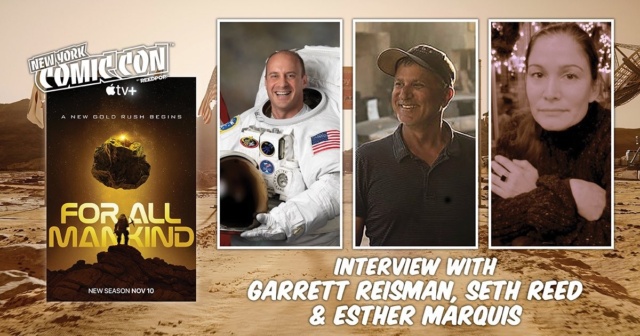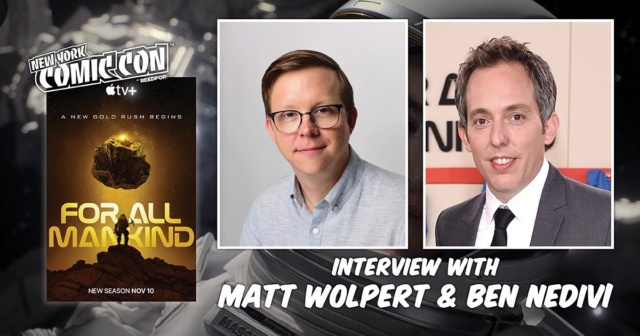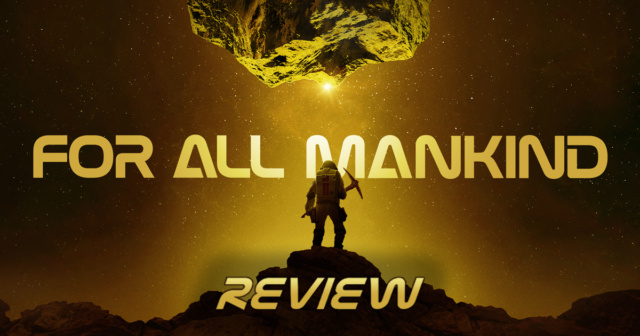NYCC Interview: Ron Moore on ‘For All Mankind’ Season 4
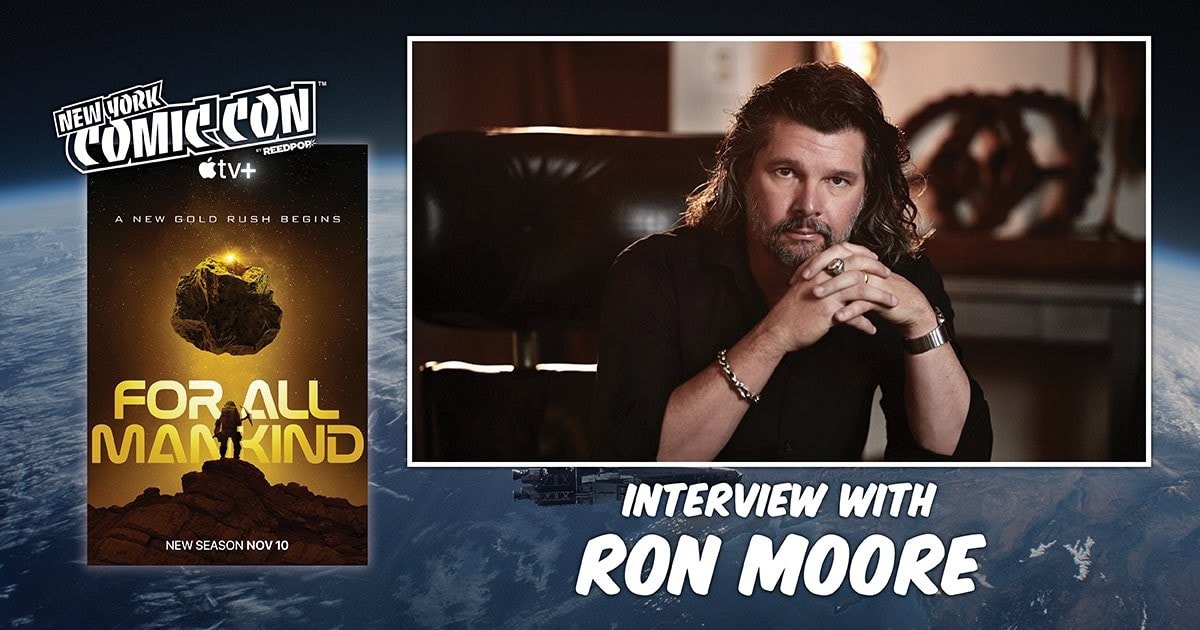
For All Mankind made a name for itself as a riveting alternate history of the space race and beyond. As we approach its 4th season premiere on November 10th, the hit sci-fi show got a splashy and exciting early premiere and panel at New York Comic Con. Over roundtables before the packed house panel, I chatted with executive producer, creator, and sci-fi legend Ron Moore.
You probably know Moore’s name if you’re a fan of the genre. Not only has he helped bring Outlander and Battlestar Galactica to the screen, but he worked on Roswell, Star Trek: Deep Space 9, Star Trek: Voyager and so much more.
Needless to say, I was excited to talk to him about the show. With the fourth season, For All Mankind ventures closer to our current period in history. The season starts in 2003 and stars Joel Kinnaman, Krys Marshall, Coral Peña, Wrenn Schmidt, Cynthy Wu, and Edi Gathegi. There are also some newcomers to the timeline where humans are on Mars, including Daniel Stern, Tyner Rushing, and Toby Kebbell.
Over our roundtables, we chatted about challenges for season 4, including how much fun it was bringing asteroids to the screen. We talked about going deeper into the Soviet side of the space race and some of what was in store for Ed (Joel Kinnaman) over the season. Check out the full interview below.
The roundtable interview with Ron Moore about For All Mankind
[Editor’s note: This interview has been lightly edited for clarity. There are also spoilers ahead for previous seasons of For All Mankind.]
Ayla Ruby: “So I guess I’ll start. So this is season four. What would you say is the most challenging thing of getting season four off and just doing it?”
Ron Moore: “Every year the production challenges are bigger, because the further we go in the story, the more it diverts from the actual timeline and the more it becomes science fiction.”
Ayla Ruby: “Yeah.”
Ron Moore: “Whereas in season one, there was still a lot of just grounded stuff and the world didn’t look radically different for quite a while. Now we’ve got full-blown Mars bases. We have a Mars-based story, you’ve got an Earth story, and then you’ve got stories that are happening in the spaceships flying out to the asteroid. And on a production level, it’s a huge lift to really be able to produce this show. There’s so many moving pieces. You’re reinventing the show every season. You have to redo. You have new costumes, you have new characters, you have age makeup, you have to redesign visual effects, you have to expand the Mars base. So it’s really, every year is just a much bigger challenge than the one that went before.”
Interviewer: “With season four being in the can, are the plans well in place for the next decade, or-”
Ron Moore: “We had a big part of what the overall story was, and we’re still on that basic story. We’ve made changes along the way in certain things. We decided to go left where we thought we were going to go right. But in general, it still feels like, yeah, we’re still on pace to go to the places that we wanted to go over the next few decades.”
Interviewer: “Is there a finale in mind or that you’re aiming for, or is that fluid as well?”
Ron Moore: “There is a general idea of what the finale would be, but we’re still being open to seeing how it develops because the finale is still hopefully a few seasons away. So you don’t want to lock into something too quickly.”
On playing with asteroids & seeing behind the Iron Curtain
Interviewer: “What about this decade, what were you most excited to tinker with, either from a technology or historical perspective?”
Ron Moore: “I think technologically it was playing with the asteroids and what would that really be like? Since there’s been various film and television pieces that have gone to asteroids from Armageddon, which I guess isn’t an asteroid, to The Expanse, which did a lot in it. Well, what’s our take on that and how do we play the physics of asteroid mining and what would it look like in our history? And then on a different level, I thought going behind the Iron Curtain with Margot and seeing what the Soviet Union had become in the early 2000s, I thought was really interesting and fun to play with.”
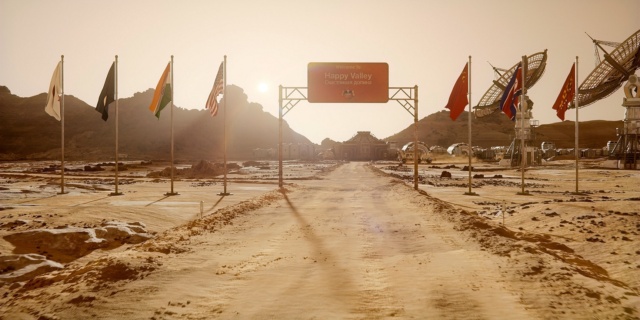
Interviewer: “Some of the effects, especially when they’ve gone back in space. I love how this show, they’re realistic as opposed to, let’s say the ’90s Star Trek: The Next Generation, where you hear stuff and it’s very silent, but yet so dramatic even though there’s no sound. You just see the picture of what’s going on. But from the first episode when they’re trying to move that asteroid and so on. What are your thoughts on that and how that’s all put together?”
Ron Moore: “It was very important to us from the beginning that the show be as realistic as possible, that we treat physics, the way physics actually works. And there are limitations on these spacecraft and they work in what we think of as idiosyncratic ways. Garrett has spent way too much time to trying to explain orbital mechanics to me. I just want the spaceship to go over here. And he’s like, ‘Well, they can’t just go over here. It has to do this.’ I’m like, ‘Fuck man.'”
But it was important to us to hold onto as much accuracy and scientific plausibility as possible, because I really wanted the audience to look at the show and go, ‘Well, this is the path that we could have gone down. This all could have really happened.’ And by implication, it still can happen. So all the things that happen in the show, all the advances in technology and the way it changes the planet, the way it changes our lives, the way it helps society and mankind at large, those things could really happen. So we wanted to keep everything within the box of, make it real so that people could take away from it like, ‘Wow, I really want to live in that world. How can we get to that place?'”
On technology that they couldn’t include
Interviewer: “With that in mind though, were there any ideas or technology that came up that you would’ve liked to have included but they were just too out there, they didn’t quite fit?”
Ron Moore: “Yeah, we had various discussions about, how fast we could get to fusion, how much you would be using it in spacecraft design by a certain point. There were plausibility factors. You saw initially it took, what was it, six months to get to Mars and we wanted to shorten that time period, but there had to be advances in the engine technology to get to there. But it was plausible, it just wouldn’t have happened right away. Those are the big things. I remember a lot of discussion about fusion and about helium on the moon, and how long it would take to do that. And it felt like it was more plausible to take a little longer than I think what we initially were thinking.”
On Ed Baldwin in For All Mankind
Ayla Ruby: “Can you talk about Ed this season a little bit, and his journey? And he’s had a lot of grief and trauma, every other season, Ed’s been tortured almost. What can you say about Ed this season? Is there anything going on?”
Ron Moore: “Ed is a man of many challenges. And we liked the idea from the beginning that Ed Baldwin is a guy that could have stepped right out of the right stuff. He’s from the Apollo era, the classic hero astronaut, that guy. Now, where does he fit in this new world that we’re creating? And see the challenges that just come up for him over and over. On a personal level, on a family level, on a societal level, his physicality, feeling like a dinosaur and not being with the times and having his own biases come up and smack him in the face periodically. And we just always wanted to keep challenging Ed, because we wanted Ed to stay in the picture. Here’s the guy that’s just determined to stay in space. He’s just not going to let it go.”
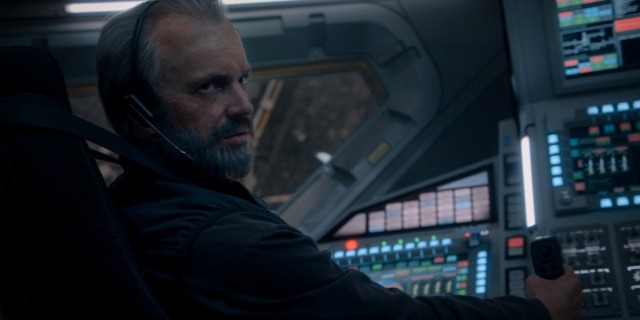
Ron Moore: “Well, what are the costs of that? And what are the things he’s willing to do in order to maintain that kind of life? He always says he puts his family first, and he doesn’t always put his family first, and then sometimes he has to face that. I think that’s a really interesting challenge when you’re telling a character story that literally spans virtually his entire life. And it’s an interesting opportunity to watch the evolution of Ed Baldwin.”
Interviewer: “For me, this show is interesting in the way that if you look at prior films or television shows, a lot of today’s real technology, you could tell it was inspired by science fiction, television and movies. With that being reversed, are you taking technology that exists in 2023 or now real world today, and twisting it around to make it fit in the 2003 Mars traveling era?”
Ron Moore: “A little bit. There’s always this dance that we’ve been doing about trying to make technological change happen faster in our alternate timeline. So you saw them get to the personal computer faster, you saw them get to a version of the internet faster, and trying flat screens and cell phones. And you’re always pulling from today and saying, “Well, what if these things that we had today existed 20 years ago, or they existed 10 years ago, how would society look a little different? And can it keep the audience a little off balance in terms of, well, it looks like 2003, because I recognize what people are wearing and the music they’re listening to. I don’t remember having that in 20… So there’s all these little Easter eggs like that that we plant throughout the show.”
Interviewer: “It’s like a whole Back To The Future II scenario, isn’t it?”
Ron Moore: “Yeah.”
On approaching season 4 of For All Mankind
Interviewer: “What are your thoughts as you guys are entering season four now? Did you expect for this to go four seasons? What are your overall feelings to the success that this show has achieved?”
Ron Moore: “I’m very proud, very happy. I am the eternal optimist. When I start every show, I’m like, “This one’s going to run forever. Of course, it’s going to be a success. People are going to love it.” So I always have that hope and that optimism, and yet there’s always doubt and you never know. And so it’s always really gratifying when people do like it, and they come back to it and you’re allowed to continue to tell the story. So it’s really great that the show has been embraced by people and that they continue to look forward to.”
On that fan theory about who killed Shane Baldwin
Ayla Ruby: “So I have a question about a fan theory, and it’s okay if there’s not an answer. So this is going back to season one with Shane. There’s a fan theory that the KGB ordered a hit on Shane.”
Ron Moore: “On Shane?”
Ayla Ruby: “Yes. And I’m just curious if you have any thoughts or can answer any questions about that?”
Ron Moore: “I can say that that was not in our minds.”
Ayla Ruby: “All right.”
Ron Moore: “But now it is in my mind. Now I may have to think about that. That’s an interesting … I never thought about it.”
Interviewer: “Taking notes.”
Ron Moore: “Yeah, I’ll take some notes. Yeah.”
Ayla Ruby: “Okay.”
Ron Moore: “Okay.”
Ayla Ruby: “That works.”
On showing the Soviet Space Program
Interviewer: “We were talking as well previously about you filming in Bulgaria, some of the storyline going there. What aspects of that are you looking forward to, the audiences?”
Ron Moore: “I think it’s just interesting to see a completely different flavor of the show. The Soviets and the Soviet Space program has always been in the series, but for the most part it’s been off-camera. And then you’ve seen a couple of cosmonauts here and there, and you’ve had some encounters in different ways, but we’ve never really gone and been on that side of the Iron Curtain.”
Ron Moore: “So I think that’s really exciting, really interesting. How did the Soviet Union change in our reality? What’s it like to be in that country in this era? And their space program is so different than ours, and people in this country, don’t even realize that. The Soviet Space program was a huge endeavor. Got a lot of the important milestones of the space race. And when you really start reading about it, you’re shocked that they did it with much lower technology. A lot of really, almost Rube Goldberg-type stuff. These guys that flew in those capsules were really gutsy, because they didn’t always work very well.”
Ron Moore: “It’s remarkable. The simulators that they were in. Did you ever see … There was a movie that came out, Salyut Six [Salyut 7] or something, I can’t remember the name, but it was about the Salyut Space Station. It’s a real story. The Russian Space Station that almost crashed. And they sent two cosmonauts up to rescue it.”
Interviewer: “I know the one, yeah.”
Ron Moore: “You know the one?”
Interviewer: “I can’t remember what it’s called.”
Ron Moore: “We can’t remember that movie. But it’s a fascinating movie because you see the way that they controlled those Soyuz craft was just ridiculous. It’s not really computers, they just have sticks and things and this window that they’re trying to pilot these things in. And you’re watching it going, “Really, you’re going to go into space in this thing?” It’s really something.”
How to watch Apple TV+’s For All Mankind
Season 4 of For All Mankind will premiere on Apple TV+ on November 10th. If you can’t wait until then, you can stream the previous three seasons now. And if you just want to jump in when the new season airs, the trailer below is a great intro to the world.
For all our past NYCC coverage, including more interviews coming this week, check it out on the NYCC tag.
NYCC Interview: Garrett Reisman, Seth Reed & Esther Marquis on For All Mankind Season 4
NYCC Interview: Matt Wolpert & Ben Nedivi on For All Mankind Season 4

